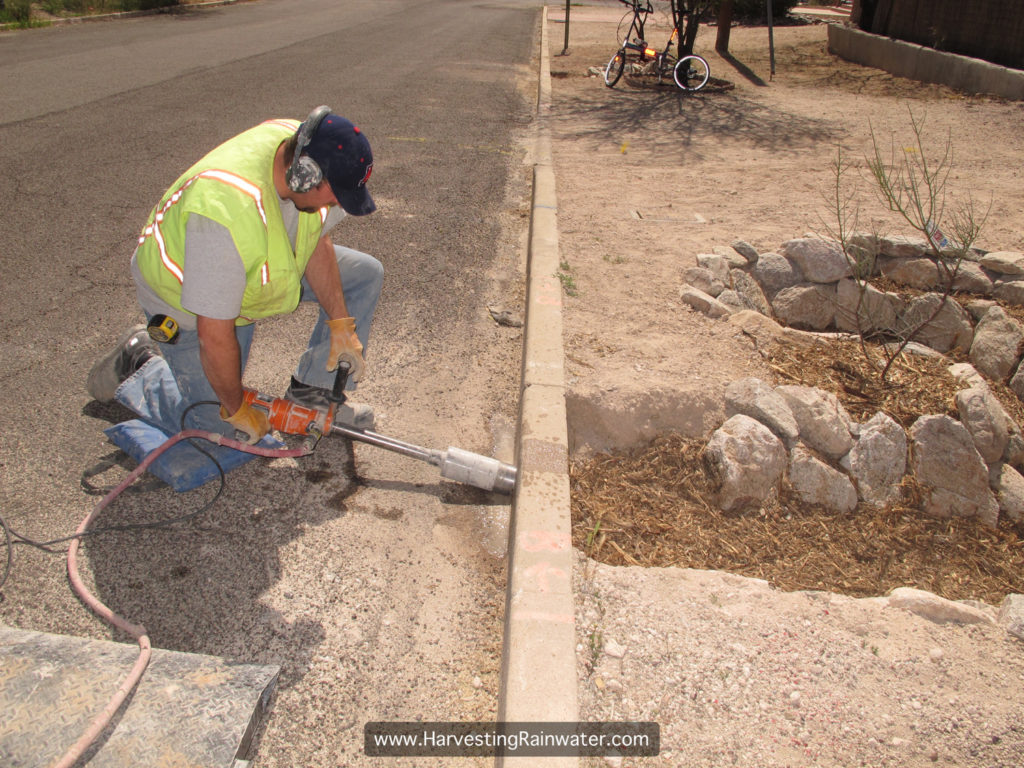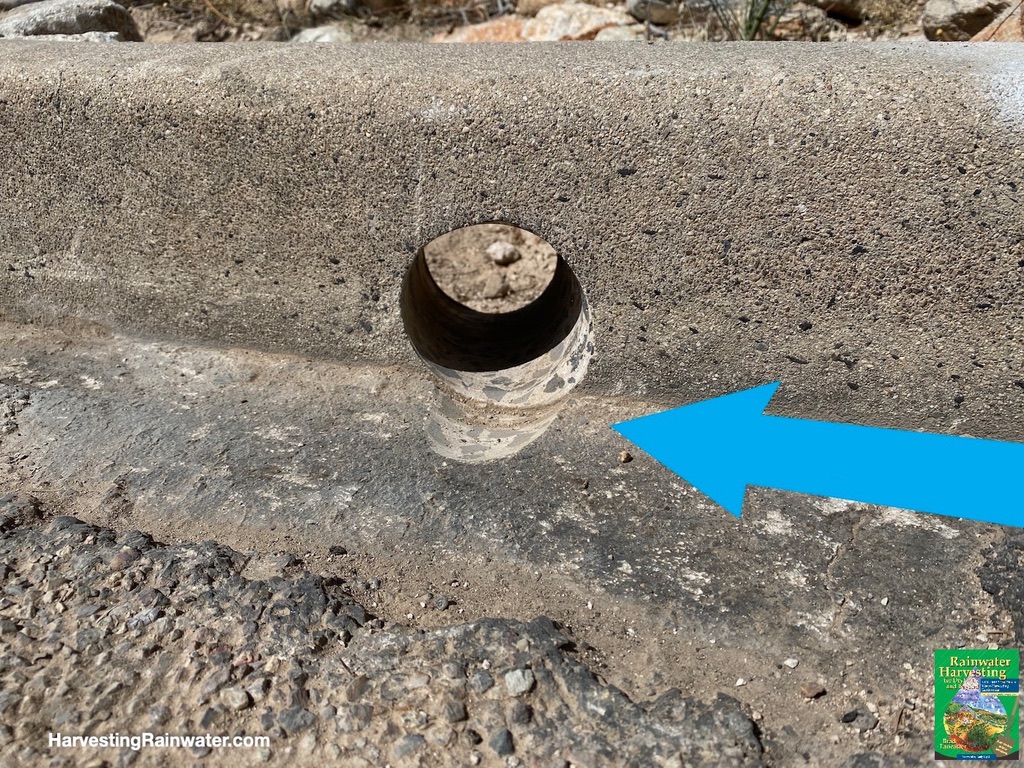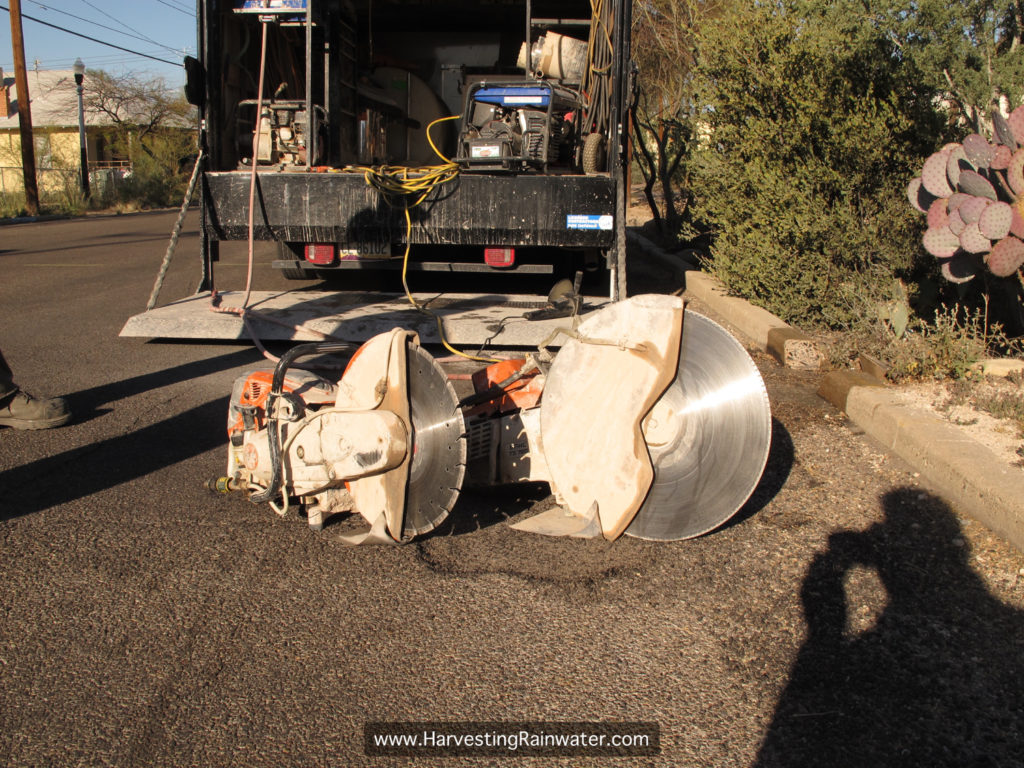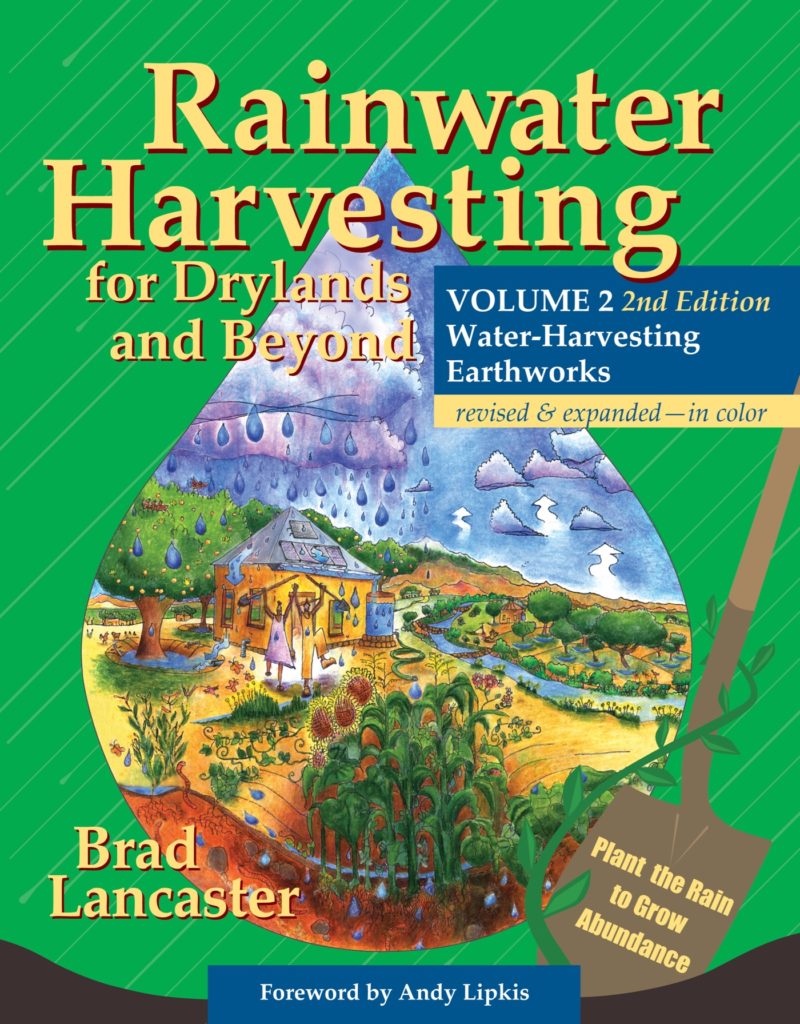Curb-Cut, Curb-Core, & Basin Creation Costs
Costs estimates are for Tucson, Arizona as of August 2021 (with some updates, as noted below)…
See chapter 8 of Rainwater Harvesting for Drylands and Beyond, Volume 2, 2nd Edition for info on how to optimally place, design, and build curb cuts and curb cores with their mulched and vegetated basins.
Curb-CUT or curb-CORE PERMIT costs:
- Permit is $45, but this can be for a whole block’s worth of curb cuts/cores, so you are incentivized to work with your neighbors. To clarify: It is $45 per permit, but you can have many curb cuts/cores on one permit.
Curb-CORE HOLE-DRILLING costs:
- 4-inch-diameter core hole through curb. Minimum cost is $250 for crew to show up, but this covers an hour of work – the drilling of at least 5 core holes if they are in the same neighborhood (the more the truck needs to drive, the more time is taken up by driving rather than drilling). If more holes are needed, the cost is the same $250 per hour, but you’ll only be charged for the time worked.
A contractor friend that cores the curb himself rents a hand-held core-drill (from Sunbelt Rental on Ft. Lowell—these drills are otherwise hard to find for rent). The rental for the whole drill set-up is less than $100 per day.


Photo: Brad Lancaster
Curb-CUT CUTTING costs:
- Cheapest option—for a curb up to 6 inches (15 cm) tall—is to rent a gas-powered, 14-inch (350-mm) diameter circular saw with diamond-carbide blade. This method also enables you to do a 14-inch-wide curb cut with 45º angled sides. Note that curbs taller than 6 inches (15 cm) will likely require a saw with a 20-inch (500-mm) diameter blade. Person doing the work must be very careful to make good clean, straight cuts. To make the horizontal cut, the basin inlet must be dug before the cut is made, so saw can cut along the dirt-side of the curb at the elevation of the bottom of the curb-side street gutter. Once all cuts are made and the cut-out section of curb is removed, the remaining curb and the cut areas must be ground smooth with a grinder. See here for step-by-step guide.
Note 1: Larger/taller curbs may require a larger saw with a 20-inch (500-mm) diameter blade, but this saw is much heavier, more difficult to use, and more dangerous to use than a 14-inch saw. So operator must be strong and very careful. Note 2: This DIY approach is not currently legal in Tucson, where you are required to hire a contractor to do the cutting of the curb—see below for those prices. Note 3: This DIY approach is legal in other communities (check with your local authorities).
Legal (in Tucson) options:
Custom Saw Cuts in Tucson charges $300 for one 2-foot curb cut with “wings” (as of January 2017). This price drops as you do more cuts, so plan ahead and team up with your neighbors to save money and increase stormwater harvesting on your block. If you are doing two 2-foot curb cuts, the price is $450, or $225 per cut. From there, the price goes up by $100 for each additional curb cut at the same location. (So three curb cuts at one location would be $550, or $183.33 per cut. Four curb cuts at one location would be $650, or $162.50 per cut.) Once all cuts are made and the cut-out section of curb is removed, the remaining curb and the cut areas are ground smooth with a grinder. The equipment used by Custom Saw Cuts makes longer-sloping wings angled less than 45º (the saw cannot cut as steep as 45º). Depending on the height of the curb, the wings will be 2–4″ longer than they would be if the angle were 45º.
Note that contractors who do the cut with a 14″ circular saw can charge much less because they don’t need the very expensive horizontal-curb-cutting machine. Tucson Concrete Cutting and Coring has the equipment to do this; call them for an estimate.
Interesting side note: Custom Saw Cuts—Tucson’s horizontal-curb-cut contractor—says 7-10% of their work is water-harvesting related.

Curb-cut/core-BASIN-DIGGING costs:
- Free if you and neighbors do the digging by hand (just make sure you first call Blue Stake—a free service marking underground utilities—to make sure you are not digging where there are underground utilities).
- If you are hiring a backhoe operator (I recommend Little John Excavating in Tucson) to dig your basins (each basin being 5 feet wide, 8-10 feet long, and 12–18 inches deep), the cost is about $200 to $250 per basin to dig basin and remove the soil dug out. (Note that this is assuming multiple basins are being dug; if fewer basins, the per-basin cost increases. Minimum charge for operator to show up and dig a basin (without removing soil) is around $300 to $400—check with operator.) The price drops the more basins that are dug, since the time/cost of transporting equipment to and from the work site is spread out among all the basins.
- Costs for hauling excavated dirt away, and rock (Catalina granite) delivered, for basins in bulleted paragraph above add about $100-$150 per basin
Interesting side note: The backhoe operator I recommend—John Litzel of Little John Excavating—says 40–60% of his work is water-harvesting related.
Curb-cut/core-BASIN ROCK costs:
If you need to rock the banks/sides of the basins (if slopes are gradual, rock may not be needed, but in small urban spaces we typically need steeper banks and thus rock to stabilize and delineate basin banks) the cost is as follows:
- Free-ish if you salvage the rock or broken-up concrete chunks (a.k.a., urbanite, from sources such as broken-up sidewalks). You just need to pay for fuel for the vehicle to move the material.
- $32 per yard of Catalina granite rock, 8–20-inch in diameter from rock supplier (e.g., Churchman Sand and Gravel). Two yards is typical minimum amount of rock for a basin 4 feet wide and 4–6 feet long. (Deeper basins will need more rock. Ordering a full truckload often results in free delivery.)
- Local water-harvesting contractor Dryland Design does great rock work. A rectangularish basin 8 feet long by 5 feet wide by 1 foot deep may cost about $450 (price varies by soil type) to expertly lay Catalina granite rock to stabilize the basin’s banks.
See here for how we organize such basin excavations, rock work, and planting in my neighborhood
Curb-cut/core-BASIN-PLANTING costs:
- Free if you grow out your own plants. A neighbor, Sky Jacobs, does this in our neighborhood. Or you can plant seed directly in basin. I’ve had 80–90% success-rate doing just that when I plant seed with the rains in the rainy season. Note: Some seed needs to be scarified (methods include nicking the seed coat with nail clippers before planting)—check with local growers for tips.
- $25-$30 per 5-gallon-size tree if you get from a local nursery.
- $8 to $12 per 1-gallon-size understory plant from a local nursery See here for recommended trees and here for more info on those and other plants for southern Arizona. See here for favorite local native plant nurseries
Curb-cut/core-BASIN-MULCHING costs:
- Free if you pick up mulch/wood chips from a local firewood distributor, if you cut up your own on-site prunings into 6-inch or shorter lengths for mulch, or if you get a local tree-trimming company (e.g., Romero Tree Service) to give you their chipped-up prunings (cheaper for them than to take “waste” to dump).
- If you want to buy mulch in Tucson, you can get high-quality screened mulch from Fairfax Companies (3-inch decorative mulch is the best, as smaller material decomposes more quickly, and can more easily float away). Fairfax turns local green “waste” into mulch. Delivery cost is the same for a full or partial truckload, so collaborate with neighbors and get a full truckload delivered.
For more

Volume 2
Especially Volume 2, and its chapter 8
